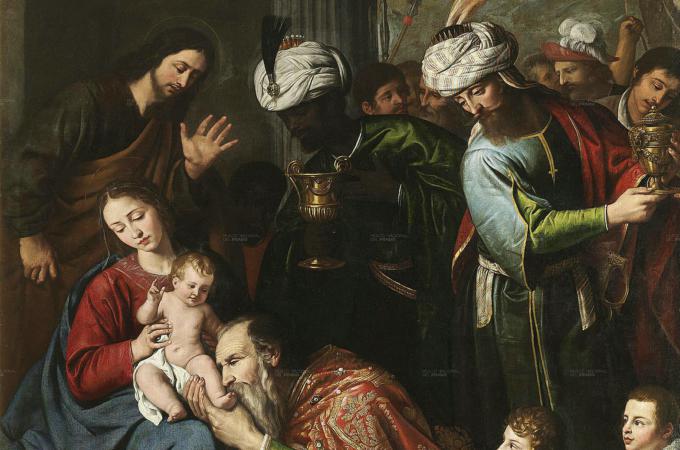The Wise Men teach us to kneel
''Now when Jesus was born in Bethlehem of Judaea in the days of Herod the king, behold, there came wise men from the east to Jerusalem, saying, Where is he that is born King of the Jews? For we have seen his star in the east, and are come to worship him," (Mt 2:1-2, KJV).
The phrase, "come to worship him," means "to kneel before him," "to make ourselves prostrate before him." They have travelled a year, perhaps even two years, with a large entourage over extremely rough terrain, perhaps from as far away as Bagdad or even Samarkand, and apparently their sole intent is to adopt the posture of suppliants before him. This is extraordinary.
It passes us by, but even more extraordinary is that they say it in the court of Herod, who was reigning then as king in Jerusalem. With apparent contempt for his kingship, established and underwritten by the occupying Roman authorities, and under the evident (and threatening) direction of a higher authority, they declare before Herod their intention to honor as King someone else.
"Were they then ignorant that Herod reigned in Jerusalem?" one of the Fathers commented, "Or that it is a capital treason to proclaim another King while one yet lives? But while they thought on the King to come, they feared not the king that was; while as yet they had not seen Christ, they were ready to die for Him."
It would not have been beyond Herod to slaughter them on the spot. Actually, his plan was probably to do so later, after they led him to the child. The wise men are therefore above all witnesses to the Kingship of Christ. They are virtual martyrs. This is the first thing that I want to say about them.
We know that the Liturgical Year in the Church ends with "The Solemnity of Our Lord Jesus Christ, King of the Universe" (its full and true title). The Sunday following marks the start of Advent, leading to the Feast of Christmas, which ends on the Epiphany, a traditional celebration of the appearance of the wise men.
Therefore, these wise men, and what they do, are a link for us, binding the Kingship of Christ to his Nativity. We think of them as showing up after Christmas, but we are really now journeying along with them, in pilgrimage, to honor Jesus as King, above earthly authorities, and to kneel before him as Lord.
There is therefore something correct in the secular sense that the greeting, "Merry Christmas," should be suppressed -- as it expresses not simply good cheer but also that your Lord is not Caesar. It is not a neutral greeting. It is a particular form of goodwill which also confesses a truth, and declares an allegiance. To use the phrase is a little bit like asking about the King while standing in Herod's court.
But the second thing I want to point out about these wise men is that their purpose was to kneel. The Wikipedia article on the "Biblical Magi" is a hodge-podge of unconnected remarks of wildly different value (unlike the old Catholic Encyclopedia entry on the "Wise Men," which gives the coherent and closely argued judgment of a fine scholar). But I was struck by this comment there about the kneeling of these wise men: "This gesture, together with Luke's birth narrative, had an important effect on Christian religious practices. ... Inspired by these verses, kneeling and prostration were adopted in the early Church."
It made me remember that when I was a Protestant I never kneeled. Sometimes we prayed while standing -- either hands held high in song, or holding hands. But usually we were sitting, hands clasped and head bowed down. Fair enough: if prayer is "conversing with the Lord," it is fitting to pray in the attitude with which we converse.
But nothing concerned with God has just one aspect. Everything is a mystery. Thus prayer too, besides being a conversation, is also petition (that is: begging) and adoration. These require, actually, that we be prostrate or, almost as a concession, kneeling.
It seems that everyone who begged the Lord for mercy did so prostrate or on bended knee, as a kind of natural response to him. Jairus fell at the feet of the Lord, imploring him on behalf of his daughter (Mk 5:22). The Canaanite woman knelt before him: "Lord help me!" she said (Mt 15:25). The man born blind, after he gained his sight, confessed, "Lord, I believe" and fell down in adoration before Jesus (Jn 9:39).
The Apostles, although close friends of the Lord, shared the same impulse. Eusebius in his church history tells us about St. James, "He was in the habit of entering alone into the temple, and was frequently found upon his knees begging forgiveness for the people, so that his knees became hard like those of a camel."
St. Peter evidently feels compelled to kneel, to accomplish a remarkable miracle in imitation of Jesus: "Peter sent them all out, and went on his knees to pray; then, turning to the body, he said, "Tabitha," 'Rise up!'; and she opened her eyes and looked at Peter, and sat up on the bed," (Acts 9:40; see Mk 5:21).
In this "minor penitential season," we could do worse than imitate the wise men in bending the knee, to ask, to honor, to adore.
- Michael Pakaluk is Professor of Ethics and Social Philosophy in the Busch School of Business at The Catholic University of America. His book on the gospel of Mark, ‘‘The Memoirs of St. Peter,’’ is available from Regnery Gateway.



















